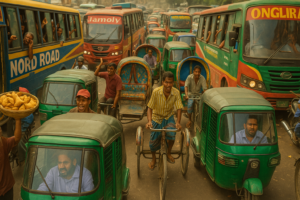Honking Toward Enlightenment: Dhaka Traffic Named 9th Wonder of the World
In an astonishing move by the Intergalactic Council of Unbelievable Phenomena (ICUP), Dhaka’s traffic has officially been declared the 9th Wonder of the World. Yes, you read that right. The capital of Bangladesh, long known for its vibrant culture, spicy street food, and occasional bouts of existential dread, is now on the global tourist map—not for its beauty, but for its gridlock.
According to officials, “Nowhere else on Earth can one stare at the same rickshaw for five consecutive hours while pondering the meaning of life.”
Why Tourists are Booking Tickets to Suffer in Style
Travel agencies are already cashing in with packages like “5 Days of Horn Symphony”, “Zen and the Art of Auto-rickshaw Maintenance”, and the wildly popular “Stuck and Enlightened: A Mindfulness Retreat on Mirpur Road.” These curated experiences promise not just sightseeing, but soul-searching—right from the backseat of a motionless Uber.
Tour operators describe it as “luxury limbo with a cultural twist,” offering complimentary bottled water, spiritual breakdowns, and even guided breathing exercises during three-hour red-light meditations. Instagram influencers are documenting their journeys from frustration to freedom under the trending hashtag #JammedButBlessed.
“I used to spend thousands on meditation retreats in Bali,” said Claire from Oregon. “But one afternoon on Airport Road, and I reached Nirvana. I even forgave my ex.”

Dhaka’s Traffic – A Timeless Experience (Literally)
Unlike the Pyramids that took centuries to build or the Colosseum that still echoes with the cries of gladiators, Dhaka traffic is an ever-evolving marvel. It expands each day with help from spontaneous U-turns, fearless drivers without licenses, and the deeply held belief that the louder you honk, the faster your vehicle moves.
Here, lanes serve more as decoration than direction, indicators are considered a sign of weakness, and traffic rules are flexible suggestions rather than laws. No two journeys are the same. One day, a bus may take three hours to crawl from Gulistan to Dhanmondi. The next day, it may not have moved at all.
Local philosopher Babul Bhai captured the essence best when he said,
“Time is something foreigners worry about. In Dhaka traffic, we leave behind time, space, and occasionally common sense. Yesterday I was late to work. Today I was late to being.”
Urban planners have tried their best with traffic lights, overpasses, and flyovers. But the congestion adapts. It is as if the city’s traffic is a living, breathing creature with the resilience of a cockroach and the calm of a monk.
To experience Dhaka traffic is to discover the true meaning of patience, unpredictability, and the wisdom of always carrying snacks wherever you go.
Key Attractions Along the Gridlock
When stuck for 7 hours trying to go 3 kilometers, there’s plenty to see and do:
-
Watch TikTok Live Battles happening on the CNG next door
-
Enjoy street-side samosas handed to you by vendors threading through buses like ninjas
-
Catch an impromptu wedding procession that just… merges into traffic
-
Contemplate your sins, past lives, and whether this was all a mistake
And don’t miss the Civic Frustration Symphony, conducted daily at rush hour. Horns, shouts, prayers—it’s like Beethoven met a blender.
Souvenirs to Remember Your Trip
No visit to Dhaka’s legendary traffic scene is complete without a few unforgettable souvenirs. After all, what better way to cherish your hours of stillness and spiritual suffering than with merchandise that smells like diesel and regret?
The most popular keepsake is the pollution-infused t-shirt boldly stamped with “I Survived Gabtoli,” now available in shades of smog and despair. For the collector with a sense of irony, there are miniature jammed buses—tiny replicas frozen in time, just like the real thing. Some tourists even purchase pocket-sized mosquito repellents, not because they fear bites, but because even the mosquitoes here are stuck and angry.
One Instagram influencer summed it up best:
“This is more authentic than Venice. That’s just water. This is emotion.”
The Economic Impact – Fuel for the Soul
The economic impact of Dhaka’s new status as the ninth wonder of the world is nothing short of miraculous. Spiritual tourism is booming, with visitors happily paying top prices to experience the city’s unique blend of chaos and contemplation. Meditation app developers have embraced the trend, adding the sounds of honking horns, roaring engines, and frustrated shouting as premium background tracks for those seeking enlightenment or perhaps just a headache.
Yoga studios across California have also joined in, creating Dhaka-inspired poses such as The Frustrated Forward Fold, Reverse Bumper Pose, and the popular CNG asana. These new exercises promise to build patience and improve the ability to stay calm amid madness.
Corporate motivational speakers have found their own inspiration, often quoting Dhaka’s bus drivers with sayings like, “If you cannot move forward, honk louder. If that does not work, shout.” This has become a mantra for resilience when stuck in place, proving that in Dhaka traffic, frustration truly feeds both the soul and the local economy.
Visit Dhaka – Get Stuck, Get Spiritual
Whether you’re a thrill-seeker, a philosopher, or just someone with too much time on their hands, Dhaka’s traffic offers a once-in-a-lifetime experience—every single day.
So, book your tickets, embrace the gridlock, and prepare for an unforgettable journey within (and slightly forward, if you’re lucky).